现在完成时态
图片预览
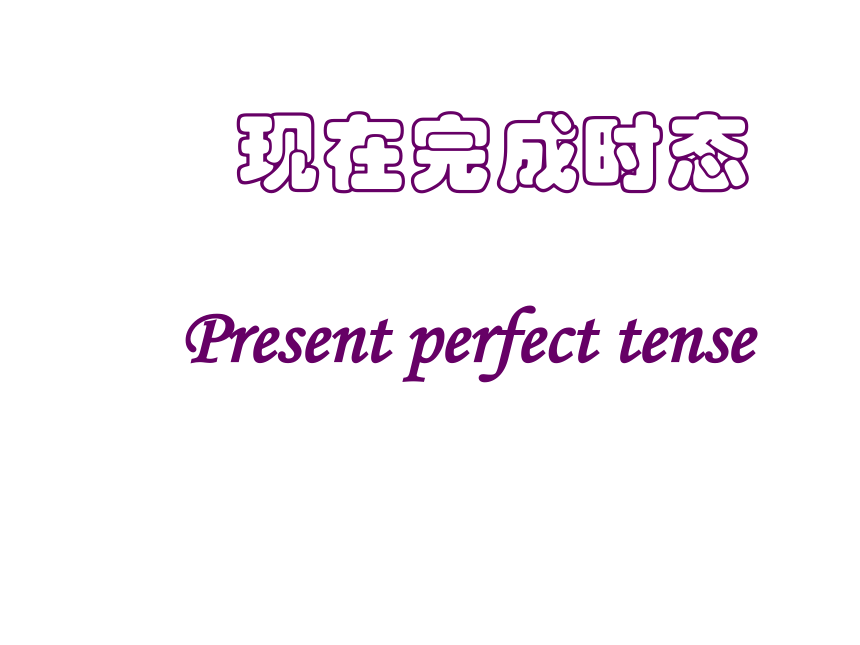
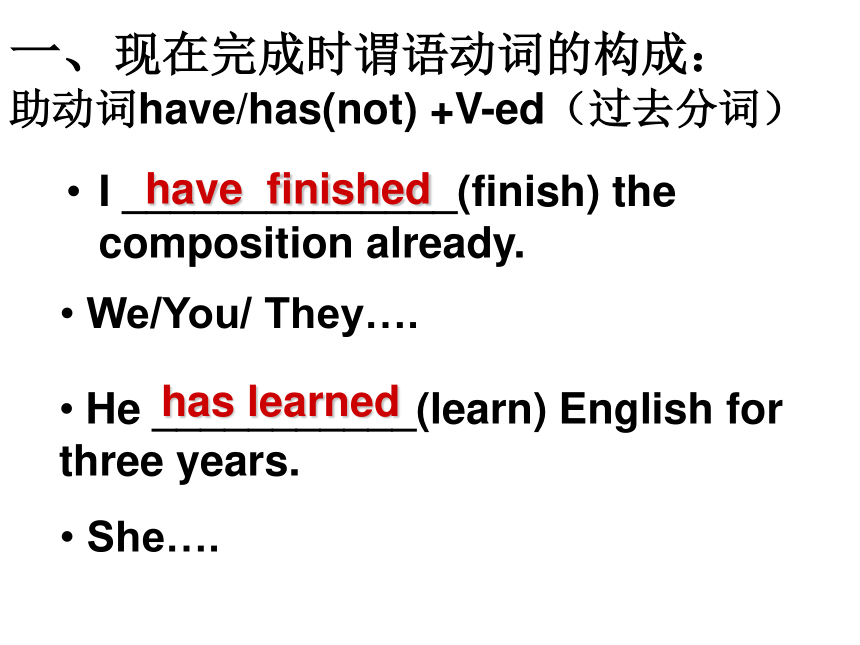
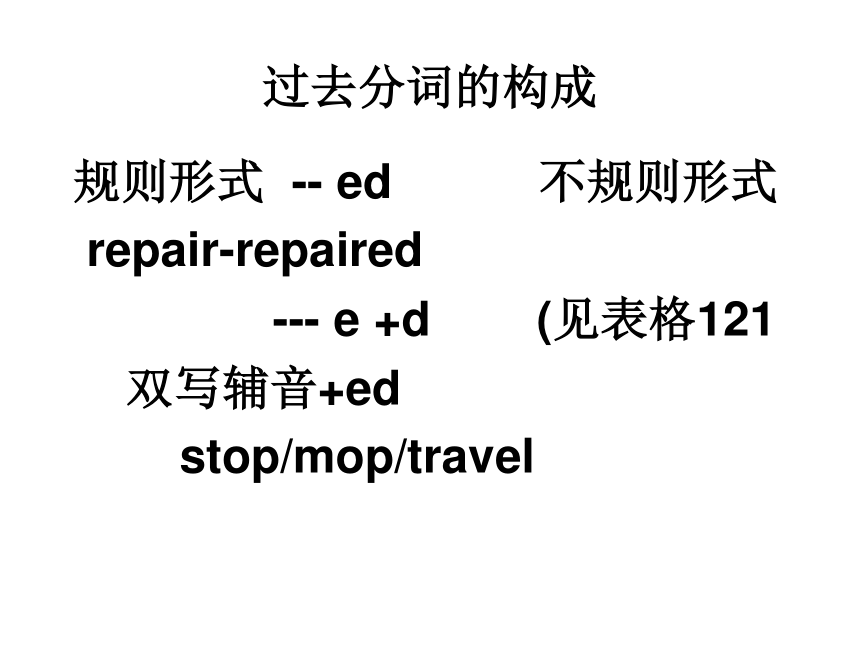
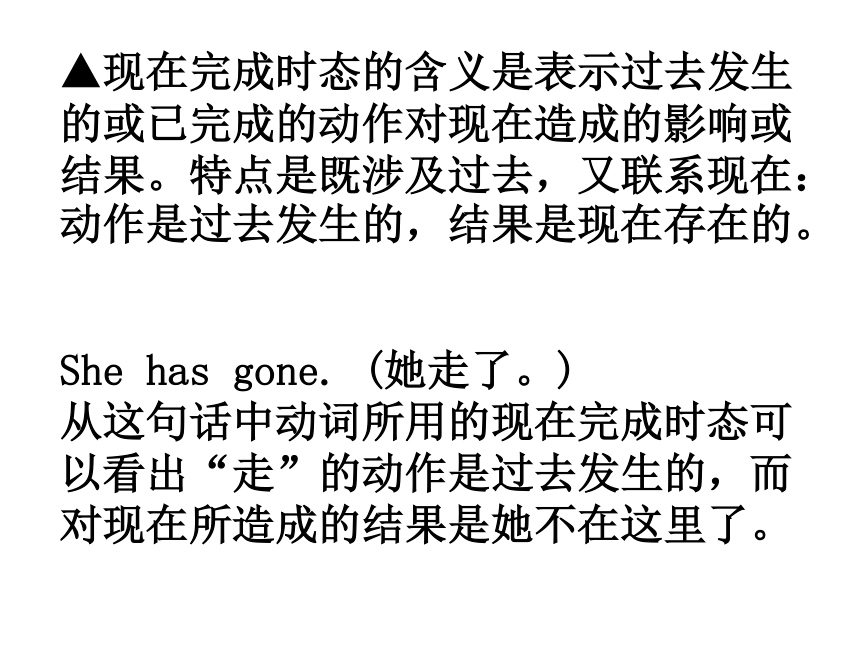
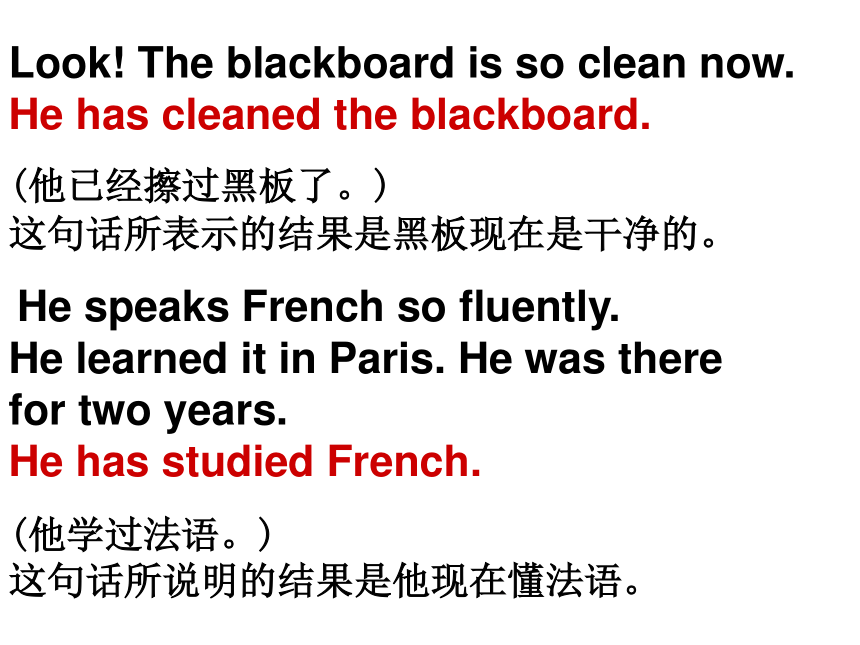
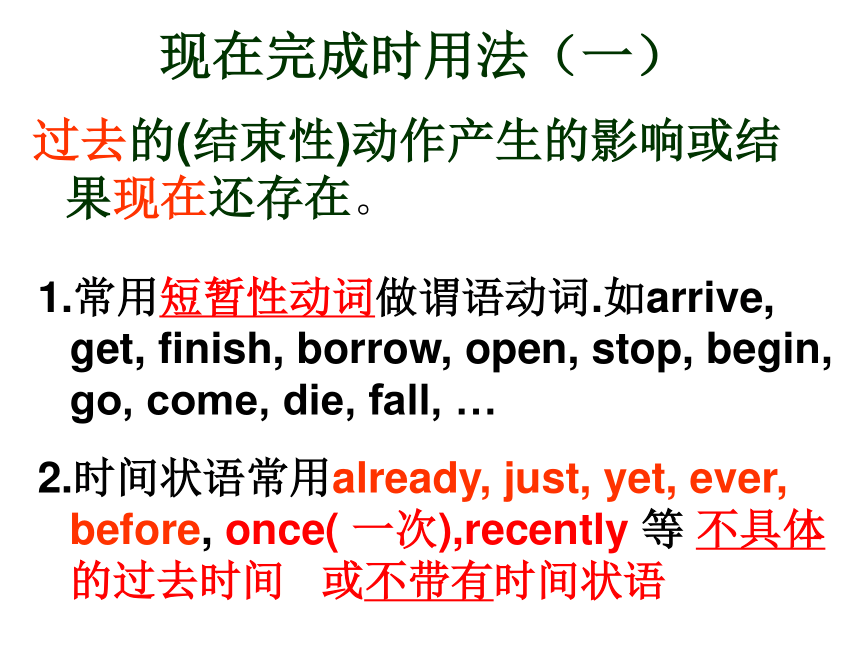
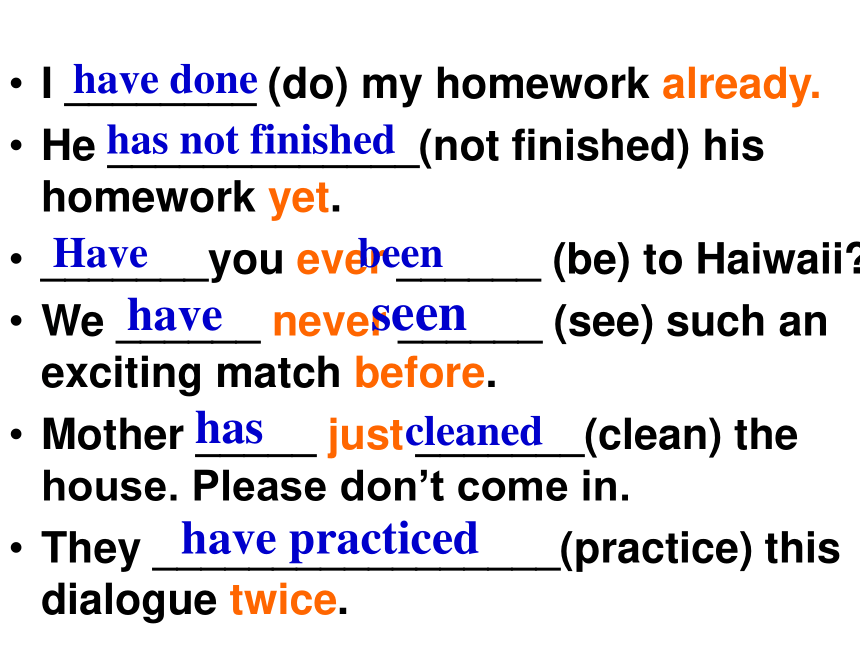
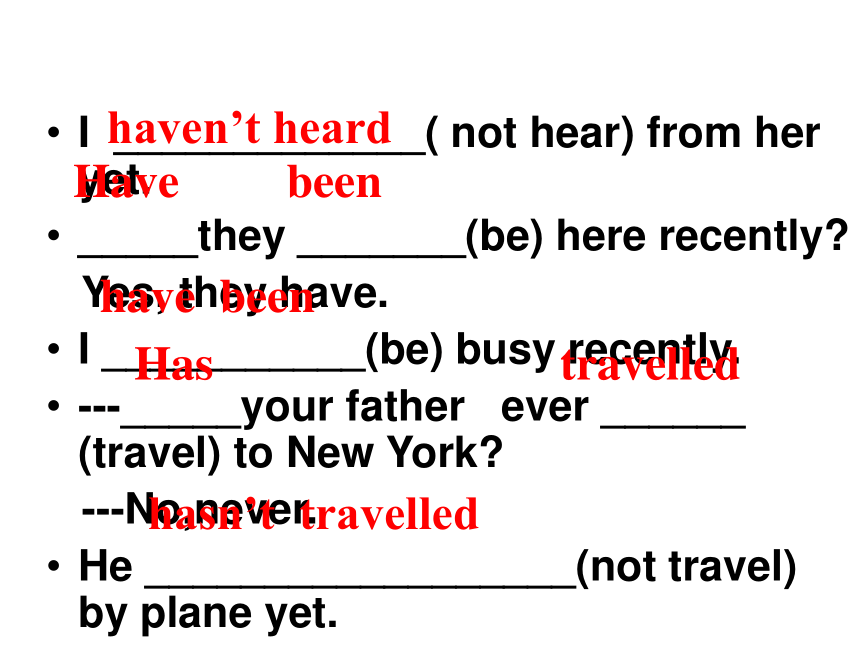
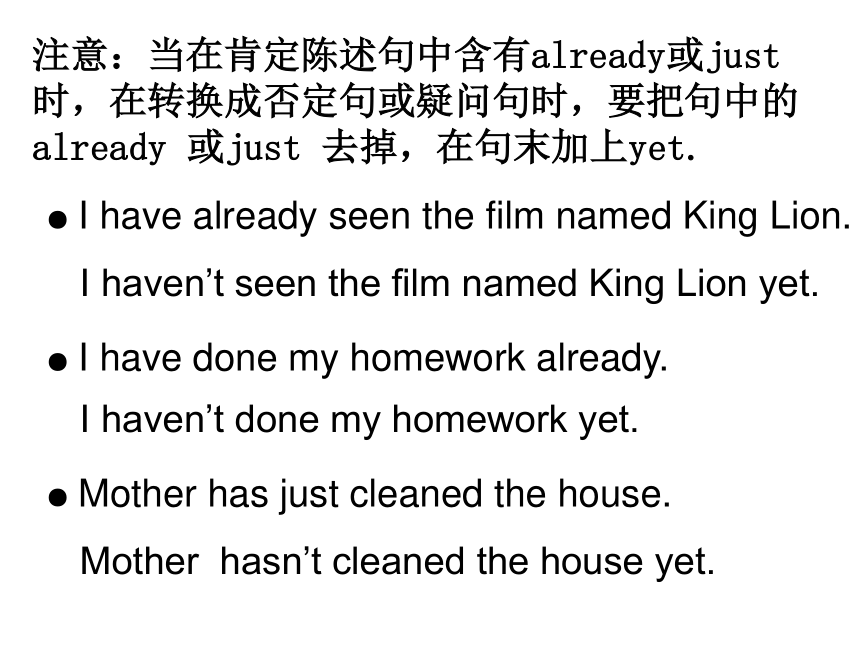
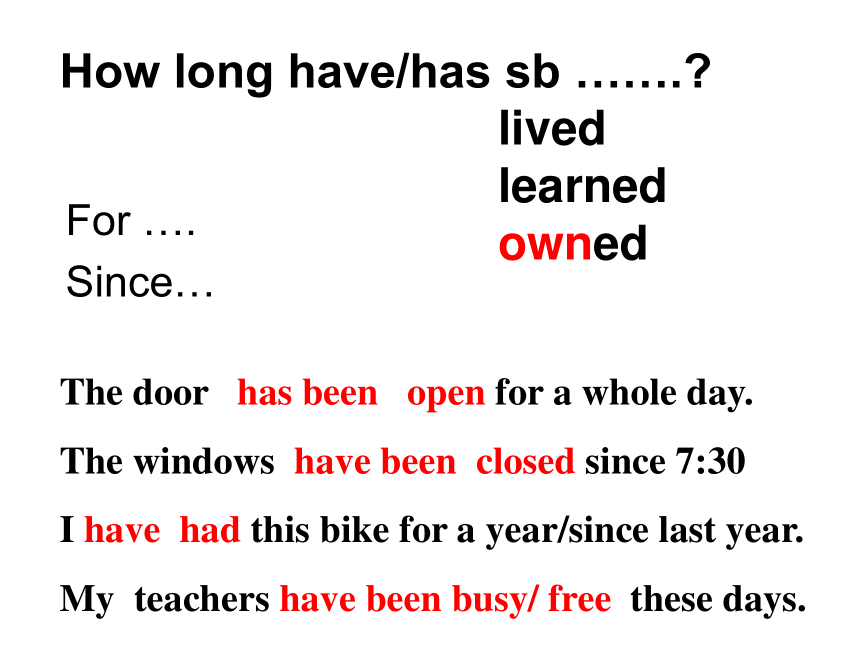
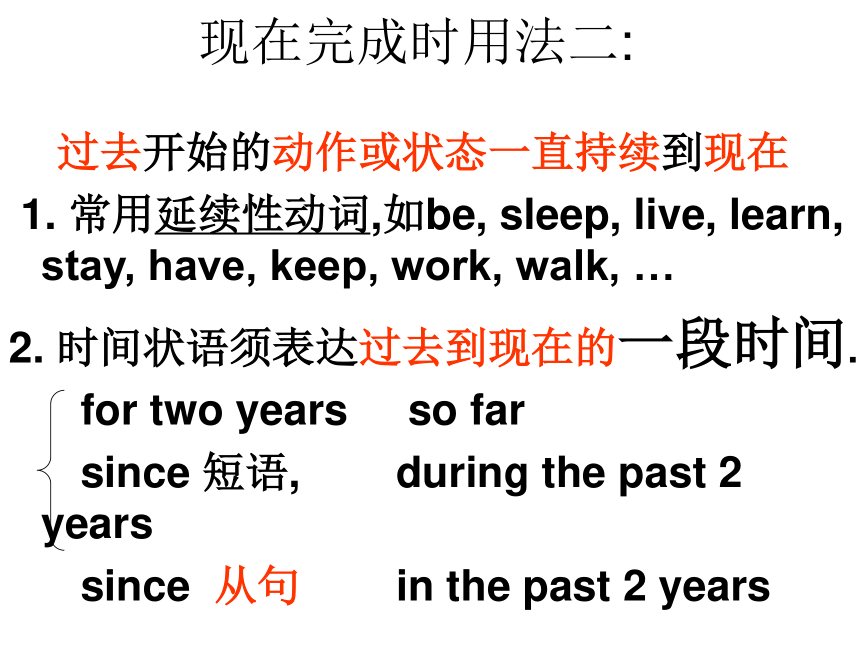
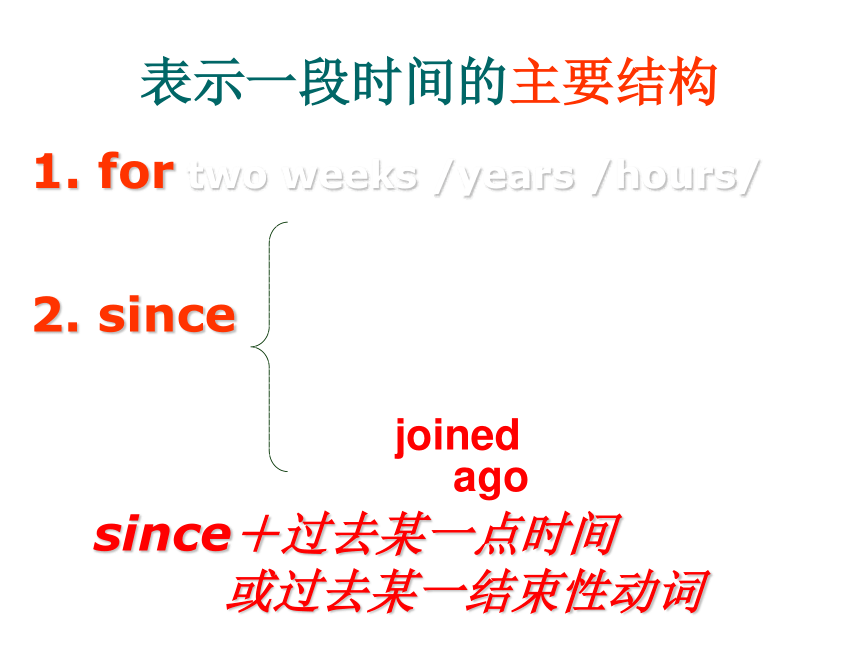
文档简介
课件38张PPT。Present perfect tense现在完成时态一、现在完成时谓语动词的构成:
助动词have/has(not) +V-ed(过去分词)I ______________(finish) the composition already. He ___________(learn) English for three years. We/You/ They…. She….have finishedhas learned过去分词的构成规则形式 -- ed 不规则形式
repair-repaired
--- e +d (见表格121
双写辅音+ed
stop/mop/travel
▲现在完成时态的含义是表示过去发生的或已完成的动作对现在造成的影响或结果。特点是既涉及过去,又联系现在:动作是过去发生的,结果是现在存在的。 She has gone. (她走了。) 从这句话中动词所用的现在完成时态可以看出“走”的动作是过去发生的,而对现在所造成的结果是她不在这里了。 He speaks French so fluently. He learned it in Paris. He was there for two years. He has studied French.
(他学过法语。) 这句话所说明的结果是他现在懂法语。Look! The blackboard is so clean now. He has cleaned the blackboard.
(他已经擦过黑板了。)? 这句话所表示的结果是黑板现在是干净的。现在完成时用法(一)过去的(结束性)动作产生的影响或结果现在还存在。常用短暂性动词做谓语动词.如arrive, get, finish, borrow, open, stop, begin, go, come, die, fall, …
时间状语常用already, just, yet, ever, before, once( 一次),recently 等 不具体的过去时间 或不带有时间状语I ________ (do) my homework already.
He _____________(not finished) his homework yet.
_______you ever ______ (be) to Haiwaii?
We ______ never ______ (see) such an exciting match before.
Mother _____ just _______(clean) the house. Please don’t come in.
They _________________(practice) this dialogue twice.have donehas not finishedHavebeenhaveseenhascleanedhave practicedI _____________( not hear) from her yet.
_____they _______(be) here recently?
Yes, they have.
I ___________(be) busy recently.
---_____your father ever ______ (travel) to New York?
---No,never.
He __________________(not travel) by plane yet.haven’t heardHave beenhave beenHas travelledhasn’t travelled注意:当在肯定陈述句中含有already或just 时,在转换成否定句或疑问句时,要把句中的already 或just 去掉,在句末加上yet. I haven’t seen the film named King Lion yet.● I have done my homework already.I haven’t done my homework yet.● Mother has just cleaned the house.Mother hasn’t cleaned the house yet.● I have already seen the film named King Lion. For ….
Since…How long have/has sb …….? lived learned owned The door has been open for a whole day.
The windows have been closed since 7:30
I have had this bike for a year/since last year.
My teachers have been busy/ free these days.现在完成时用法二:
过去开始的动作或状态一直持续到现在
1. 常用延续性动词,如be, sleep, live, learn, stay, have, keep, work, walk, …
2. 时间状语须表达过去到现在的一段时间.
for two years so far
since 短语, during the past 2 years
since 从句 in the past 2 years表示一段时间的主要结构2000
last week
yesterday (evening)
three weeks ago
he joined the Party two years ago
1. for two weeks /years /hours/2. sincesince+过去某一点时间
或过去某一结束性动词
标志词:for +一段时间, since+过去的时间点, these years, so far, in the past/last …yearsWe __________ (learn) English for three years/ since two years ago/since 2000.
Mr. Green _________ (be) in China these years.
They ____________(write) 15 songs so far.
The population ____________ (grow) more slowly in the past ten years.have learnedhas beenhave writtenhas grown1.The Jiangs ___________(live) here for almost ten years.
2.He _____________(work) in the factory since 1994.
3.His parent ___________(teach) in this school since they came to the city.
4.The child ____________(sleep)since two hours ago.have livedhas workedhas taughthas sleptWork in pairs:Doctor: What’s wrong with you,young man?
Man: Maybe I __________(catch) a cold.
D : How long _____ you _____(be) like this?
M : _____ yesterday morning.
D : _____ you _____(take) the temperature yet?
M : No, ___ yet.
D :….Oh,you have had a little fever. _____you______(take)any medicine yet?
M : I _____(take) some aspirin this morning.
D : How many pills _____you ever______(take) so far?
M : About four pills.
D : Ok. It’s nothing serious. Don’t worry. You have to stay in bed for a few hours drink plenty of water. You’ll be better tomorrow.have caughthave beenSinceHave takennotHave takentookhave taken现在完成时用法三:现在完成时和一般过去时都能表示过去发生过的动作,但现在完成时表示过去动作对现在的影响,并且表示这一动作已完成或还可能继续下去;而一般过去时与现在的情况没有联系,仅表示过去的动作,且这一动作到说话时已终止。因此现在完成时不能与表示明确的过去时间如when,in1949,yesterday,last week等的状语连用,并且用when或where对这些时间和地点状语提问时,一般只用一般过去时。 现在完成时用法四:在“it is first/second...time that...。”或在“it/this/that is the +最高级+名词+that...。”结构中,that从句中的动词常用现在完成时;在“it + be ...+since从句”这一结构中,be可用一般现在时或现在完成时,since从句一般用过去时 用于现在完成时的句型1)It is the first / second time…. that…结构中的从句部分,用现在完成时。
It is the first time that I have visited the city.
It was the third time that the boy had been late.
2)This is the… that…结构,that 从句要用现在完成时.
This is the best film that I've (ever) seen.
这是我看过的最好的电影。
This is the first time (that) I've heard him sing.这是我第一次听他唱歌。 Work in pairs: P17I must say (that) sb/sth is the best/… I have seen.
…. most….Work in pairs:
A: What places in China have you visited?
B:….
A:Have you ever travelled ….by..?
B:…..
A: By the way, when did you go to….?
B: ….I must say that it’s the most beautiful/interesting place I have…
现在完成时和一般过去时的区别:现在完成时,强调这一动作产生的结果对现在的影响,与现在有关。 一般过去时,仅仅表示在过去某一时刻曾发生过这一动作,与现在无关。 他已学英语五年了。 He has studied English for five years. 他曾学过五年英语。 He studied English for five years. (说明他还继续学下去) (只说明他过去学过五年英语,但现在不学了。) 一般过去时与现在完成时有一些明显的时间状语。 遇到yesterday, Last year, in May, in+过去某一年,two days ago, the other day, just now等就用一般过去时 当有 just,already,yet,so far, in the past/ last few days(在过去/最近的几年里),since接过去时间状语或过去时的句子等常用现在完成时 一般过去时的时间状语:
yesterday, last week,…ago, in1980, in October, just now, 具体的时间状语
共同的时间状语:
this morning, tonight, this April, now, once,before, already, recently,lately
现在完成时的时间状语
for, since, so far, ever, never, just, yet, till / until, up to now, in past years, always, 现在完成时和一般过去时的区别二: 3)现在完成时可表示持续到现在的动作或状态,动词一般是延续性的,如live, teach, learn, work, study, know.
过去时常用的非持续性动词有come, go, leave, start, die, finish, become, get married等。
举例:
I saw this film yesterday.
(强调看的动作发生过了。)
I have seen this film.
(强调对现在的影响,电影的内容已经知道了。)
Why did you get up so early?
(强调起床的动作已发生过了。)
Who hasn't handed in his paper?
(强调有卷子,可能为不公平竞争。) 小窍门:当现在完成时+一段时间,这一结构中,我们用下面的公式转化,很容易就能排除非延续动词在完成时中的误使。
1)(对) Tom has studied Russian for three years.
= Tom began to study Russian three years ago, and is still studying it now.
2)(错) Harry has got married for six years.
= Harry began to get married six years ago, and is still getting married now.
显然,第二句不对,它应改为 Harry got married six years ago.或 Harry has been married for six years. 现在完成时和一般过去时He ____________(work) in our school for one year.
He ______(come) to our school last year/in 2002.
They _______________(cook) the supper already.
They ___________ (cook) the supper half an hour ago.
He _____just _______(pass) the exam.
He ___________(pass) the exam just now.has workedcamehave cookedcookedhas passedpassed1.---_____the film _____(开始)?
---Yes, it _____ (开始)ten minutes ago.
2.I _____(读) this book.
I ______ (读)it last Sunday.
3.____you ____ (完成) yourhomework? Yes.
When___ you ____(完成)it? A minute ago.
4. I won’t see the film. I _______ it(看了) .
I ____ (看)it last week.
5.----I ____ (找到)a watch already.
---Where ___ you _____it?
----In the playground.Class is over.Class began five minutes agoClass has been on for five minutes.短暂性动词转换为延续性动词1.buy -----------have(我买电脑两年了.)
2.borrow -------keep(他借这本书三个星期.)
3.begin to sleep/study/去掉begin to
( 他已睡了半个小时了.)
4.move into -----live in(他已搬进来三个月了.)
5.leave home -----be away from home
(我已离家一年.)
6.fall ill-----be ill(Helen病了一周了)7.join the group---be in the group
be a member of …
(我们加入电脑兴趣小组已有两年了.)
8. die-----be dead (我爷爷死了两个月了)
9.get up----- be up (他已起床一刻钟了.)
10.begin---- be on (会议已开始十分钟.)
11. come to …/ arrive in… /get to…
-------be in …(他已到南京三天了.)
12. open /close---- be open/be closed
(门开/关了十分钟了)1. turn on the radio---keep the radio on
He turned on the radio an hour ago.
He ______ _____ the radio _____ for an hour.
The radio _____ _____ _____ for an hour.
2. open the door---keep the door open
I opened the door twenty minutes ago.
I _____ ______ the door ______ for 20 minutes.
The door ____ _____ ______ for 20 minutes.
has kept onhas been onhave kept openhas been openhave/has gone to… have/has been in … have/has been to… 1.A: Where’s Jim, Li Lei?
B: He ______________his school library.
2.The Greens _____________China for three years.
We _____________the Great Wall twice. It’s very beautiful.has gone tohave been inhave been to BAABB stay A她以前曾去过上海。 She has been to Shanghai before. 他在上海10年了。 She has been in Shanghai for ten years 他去上海了。He has gone to Shanghai.表示动作或状态从过去开始一直延续到现在甚至将来Mike borrowed the books two days ago.Mike has kept the books for two days.所用的动词无延续性,不与一段时间连用
He has come to China for two years. (X)
come to …
arrive in/at.. be in …
get to…
He has been in China for two years.
since two years ago.
Beijing Museum exhibitions /,eksi’bi?n/century
/`sent??ri /Beijing’s past and present have collected A: __________you _______(see) the exhibitions recently?
B:Yes, I ____ _____ one at Beijing Museum.
A: What’s it about?
B: I _______ ________(forget) the title. It’s about the changes over the past century.
I ________ ____________(learn) a lot about Beijing’s _______ and _________.
Have seenhave seenhave forgottenhave learnedpast presentsince的四种用法 1) since +过去一个时间点(如具体的年、月、日期、钟点、1980, last month, half past six)。
I have been here since 1989.
2) since +一段时间+ ago
I have been here since five months ago.
3) since +从句
Great changes have taken place since you left.
Considerable time has elapsed since we have been here.
4) It is +一段时间+ since从句
It is two years since I became a postgraduate student.
repair-repaired
--- e +d (见表格121
双写辅音+ed
stop/mop/travel
▲现在完成时态的含义是表示过去发生的或已完成的动作对现在造成的影响或结果。特点是既涉及过去,又联系现在:动作是过去发生的,结果是现在存在的。 She has gone. (她走了。) 从这句话中动词所用的现在完成时态可以看出“走”的动作是过去发生的,而对现在所造成的结果是她不在这里了。 He speaks French so fluently. He learned it in Paris. He was there for two years. He has studied French.
(他学过法语。) 这句话所说明的结果是他现在懂法语。Look! The blackboard is so clean now. He has cleaned the blackboard.
(他已经擦过黑板了。)? 这句话所表示的结果是黑板现在是干净的。现在完成时用法(一)过去的(结束性)动作产生的影响或结果现在还存在。常用短暂性动词做谓语动词.如arrive, get, finish, borrow, open, stop, begin, go, come, die, fall, …
时间状语常用already, just, yet, ever, before, once( 一次),recently 等 不具体的过去时间 或不带有时间状语I ________ (do) my homework already.
He _____________(not finished) his homework yet.
_______you ever ______ (be) to Haiwaii?
We ______ never ______ (see) such an exciting match before.
Mother _____ just _______(clean) the house. Please don’t come in.
They _________________(practice) this dialogue twice.have donehas not finishedHavebeenhaveseenhascleanedhave practicedI _____________( not hear) from her yet.
_____they _______(be) here recently?
Yes, they have.
I ___________(be) busy recently.
---_____your father ever ______ (travel) to New York?
---No,never.
He __________________(not travel) by plane yet.haven’t heardHave beenhave beenHas travelledhasn’t travelled注意:当在肯定陈述句中含有already或just 时,在转换成否定句或疑问句时,要把句中的already 或just 去掉,在句末加上yet. I haven’t seen the film named King Lion yet.● I have done my homework already.I haven’t done my homework yet.● Mother has just cleaned the house.Mother hasn’t cleaned the house yet.● I have already seen the film named King Lion. For ….
Since…How long have/has sb …….? lived learned owned The door has been open for a whole day.
The windows have been closed since 7:30
I have had this bike for a year/since last year.
My teachers have been busy/ free these days.现在完成时用法二:
过去开始的动作或状态一直持续到现在
1. 常用延续性动词,如be, sleep, live, learn, stay, have, keep, work, walk, …
2. 时间状语须表达过去到现在的一段时间.
for two years so far
since 短语, during the past 2 years
since 从句 in the past 2 years表示一段时间的主要结构2000
last week
yesterday (evening)
three weeks ago
he joined the Party two years ago
1. for two weeks /years /hours/2. sincesince+过去某一点时间
或过去某一结束性动词
标志词:for +一段时间, since+过去的时间点, these years, so far, in the past/last …yearsWe __________ (learn) English for three years/ since two years ago/since 2000.
Mr. Green _________ (be) in China these years.
They ____________(write) 15 songs so far.
The population ____________ (grow) more slowly in the past ten years.have learnedhas beenhave writtenhas grown1.The Jiangs ___________(live) here for almost ten years.
2.He _____________(work) in the factory since 1994.
3.His parent ___________(teach) in this school since they came to the city.
4.The child ____________(sleep)since two hours ago.have livedhas workedhas taughthas sleptWork in pairs:Doctor: What’s wrong with you,young man?
Man: Maybe I __________(catch) a cold.
D : How long _____ you _____(be) like this?
M : _____ yesterday morning.
D : _____ you _____(take) the temperature yet?
M : No, ___ yet.
D :….Oh,you have had a little fever. _____you______(take)any medicine yet?
M : I _____(take) some aspirin this morning.
D : How many pills _____you ever______(take) so far?
M : About four pills.
D : Ok. It’s nothing serious. Don’t worry. You have to stay in bed for a few hours drink plenty of water. You’ll be better tomorrow.have caughthave beenSinceHave takennotHave takentookhave taken现在完成时用法三:现在完成时和一般过去时都能表示过去发生过的动作,但现在完成时表示过去动作对现在的影响,并且表示这一动作已完成或还可能继续下去;而一般过去时与现在的情况没有联系,仅表示过去的动作,且这一动作到说话时已终止。因此现在完成时不能与表示明确的过去时间如when,in1949,yesterday,last week等的状语连用,并且用when或where对这些时间和地点状语提问时,一般只用一般过去时。 现在完成时用法四:在“it is first/second...time that...。”或在“it/this/that is the +最高级+名词+that...。”结构中,that从句中的动词常用现在完成时;在“it + be ...+since从句”这一结构中,be可用一般现在时或现在完成时,since从句一般用过去时 用于现在完成时的句型1)It is the first / second time…. that…结构中的从句部分,用现在完成时。
It is the first time that I have visited the city.
It was the third time that the boy had been late.
2)This is the… that…结构,that 从句要用现在完成时.
This is the best film that I've (ever) seen.
这是我看过的最好的电影。
This is the first time (that) I've heard him sing.这是我第一次听他唱歌。 Work in pairs: P17I must say (that) sb/sth is the best/… I have seen.
…. most….Work in pairs:
A: What places in China have you visited?
B:….
A:Have you ever travelled ….by..?
B:…..
A: By the way, when did you go to….?
B: ….I must say that it’s the most beautiful/interesting place I have…
现在完成时和一般过去时的区别:现在完成时,强调这一动作产生的结果对现在的影响,与现在有关。 一般过去时,仅仅表示在过去某一时刻曾发生过这一动作,与现在无关。 他已学英语五年了。 He has studied English for five years. 他曾学过五年英语。 He studied English for five years. (说明他还继续学下去) (只说明他过去学过五年英语,但现在不学了。) 一般过去时与现在完成时有一些明显的时间状语。 遇到yesterday, Last year, in May, in+过去某一年,two days ago, the other day, just now等就用一般过去时 当有 just,already,yet,so far, in the past/ last few days(在过去/最近的几年里),since接过去时间状语或过去时的句子等常用现在完成时 一般过去时的时间状语:
yesterday, last week,…ago, in1980, in October, just now, 具体的时间状语
共同的时间状语:
this morning, tonight, this April, now, once,before, already, recently,lately
现在完成时的时间状语
for, since, so far, ever, never, just, yet, till / until, up to now, in past years, always, 现在完成时和一般过去时的区别二: 3)现在完成时可表示持续到现在的动作或状态,动词一般是延续性的,如live, teach, learn, work, study, know.
过去时常用的非持续性动词有come, go, leave, start, die, finish, become, get married等。
举例:
I saw this film yesterday.
(强调看的动作发生过了。)
I have seen this film.
(强调对现在的影响,电影的内容已经知道了。)
Why did you get up so early?
(强调起床的动作已发生过了。)
Who hasn't handed in his paper?
(强调有卷子,可能为不公平竞争。) 小窍门:当现在完成时+一段时间,这一结构中,我们用下面的公式转化,很容易就能排除非延续动词在完成时中的误使。
1)(对) Tom has studied Russian for three years.
= Tom began to study Russian three years ago, and is still studying it now.
2)(错) Harry has got married for six years.
= Harry began to get married six years ago, and is still getting married now.
显然,第二句不对,它应改为 Harry got married six years ago.或 Harry has been married for six years. 现在完成时和一般过去时He ____________(work) in our school for one year.
He ______(come) to our school last year/in 2002.
They _______________(cook) the supper already.
They ___________ (cook) the supper half an hour ago.
He _____just _______(pass) the exam.
He ___________(pass) the exam just now.has workedcamehave cookedcookedhas passedpassed1.---_____the film _____(开始)?
---Yes, it _____ (开始)ten minutes ago.
2.I _____(读) this book.
I ______ (读)it last Sunday.
3.____you ____ (完成) yourhomework? Yes.
When___ you ____(完成)it? A minute ago.
4. I won’t see the film. I _______ it(看了) .
I ____ (看)it last week.
5.----I ____ (找到)a watch already.
---Where ___ you _____it?
----In the playground.Class is over.Class began five minutes agoClass has been on for five minutes.短暂性动词转换为延续性动词1.buy -----------have(我买电脑两年了.)
2.borrow -------keep(他借这本书三个星期.)
3.begin to sleep/study/去掉begin to
( 他已睡了半个小时了.)
4.move into -----live in(他已搬进来三个月了.)
5.leave home -----be away from home
(我已离家一年.)
6.fall ill-----be ill(Helen病了一周了)7.join the group---be in the group
be a member of …
(我们加入电脑兴趣小组已有两年了.)
8. die-----be dead (我爷爷死了两个月了)
9.get up----- be up (他已起床一刻钟了.)
10.begin---- be on (会议已开始十分钟.)
11. come to …/ arrive in… /get to…
-------be in …(他已到南京三天了.)
12. open /close---- be open/be closed
(门开/关了十分钟了)1. turn on the radio---keep the radio on
He turned on the radio an hour ago.
He ______ _____ the radio _____ for an hour.
The radio _____ _____ _____ for an hour.
2. open the door---keep the door open
I opened the door twenty minutes ago.
I _____ ______ the door ______ for 20 minutes.
The door ____ _____ ______ for 20 minutes.
has kept onhas been onhave kept openhas been openhave/has gone to… have/has been in … have/has been to… 1.A: Where’s Jim, Li Lei?
B: He ______________his school library.
2.The Greens _____________China for three years.
We _____________the Great Wall twice. It’s very beautiful.has gone tohave been inhave been to BAABB stay A她以前曾去过上海。 She has been to Shanghai before. 他在上海10年了。 She has been in Shanghai for ten years 他去上海了。He has gone to Shanghai.表示动作或状态从过去开始一直延续到现在甚至将来Mike borrowed the books two days ago.Mike has kept the books for two days.所用的动词无延续性,不与一段时间连用
He has come to China for two years. (X)
come to …
arrive in/at.. be in …
get to…
He has been in China for two years.
since two years ago.
Beijing Museum exhibitions /,eksi’bi?n/century
/`sent??ri /Beijing’s past and present have collected A: __________you _______(see) the exhibitions recently?
B:Yes, I ____ _____ one at Beijing Museum.
A: What’s it about?
B: I _______ ________(forget) the title. It’s about the changes over the past century.
I ________ ____________(learn) a lot about Beijing’s _______ and _________.
Have seenhave seenhave forgottenhave learnedpast presentsince的四种用法 1) since +过去一个时间点(如具体的年、月、日期、钟点、1980, last month, half past six)。
I have been here since 1989.
2) since +一段时间+ ago
I have been here since five months ago.
3) since +从句
Great changes have taken place since you left.
Considerable time has elapsed since we have been here.
4) It is +一段时间+ since从句
It is two years since I became a postgraduate student.
同课章节目录
- 词法
- 名词
- 动词和动词短语
- 动词语态
- 动词时态
- 助动词和情态动词
- 非谓语动词
- 冠词
- 代词
- 数词和量词
- 形容词副词及其比较等级
- 介词和介词短语
- 连词和感叹词
- 构词法
- 相似、相近词比较
- 句法
- 陈述句
- 一般疑问句和否定疑问句
- 特殊疑问句及选择疑问句
- 反意疑问句
- 存在句(There be句型)
- 宾语从句
- 定语从句
- 状语从句
- 主谓一致问题
- 简单句
- 并列句
- 复合句
- 主谓一致
- 主、表语从句
- 名词性从句
- 直接引语和间接引语
- 虚拟语气
- 感叹句
- 强调句
- 倒装句
- 祈使句
- 句子的成分
- 句子的分类
- 题型专区
- 单项选择部分
- 易错题
- 完形填空
- 阅读理解
- 词汇练习
- 听说训练
- 句型转换
- 补全对话
- 短文改错
- 翻译
- 书面表达
- 任务型阅读
- 语法填空
- 其他资料
